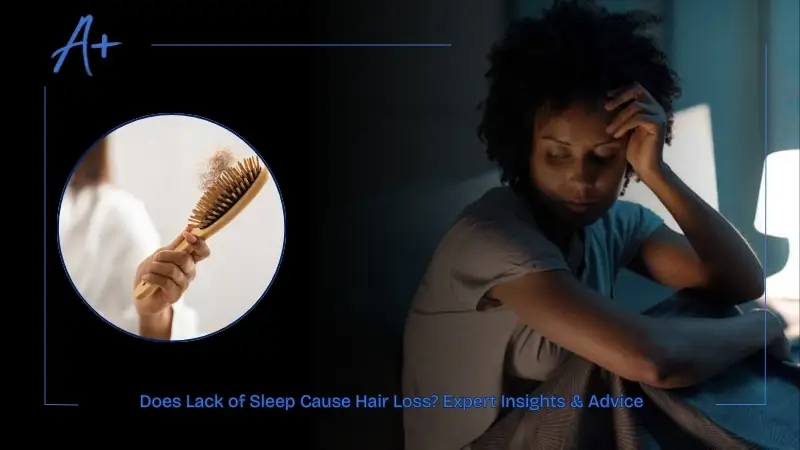
Hair loss is a common concern affecting millions of people worldwide. Sleep issues are also prevalent, with about 62% of adults suffering from lack of sleep. Sleep is essential for bodily processes, including hair growth.
There can be many reasons for hair loss, like genetics, aging, and hormonal imbalances, but many wonder, does lack of sleep cause hair loss?
Let’s explore in this article how lack of sleep can affect hair growth and the connection between sleep and hair health.

Disrupts Hair Growth Cycle
Poor sleep can lead to hormonal issues, stress, and disturbed hair growth cycles, potentially leading to increased shedding and thinning of hair follicles.
The main factor is stress which damages hair growth and weakens hair roots.
Our hair grows in 3 phases:
-
-
- Anagen (Growth Phase) – Active hair growth (2-7 years)
- Catagen (Transition Phase) – Hair stops growing (2-3 weeks)
- Telogen (Resting Phase) – Hair sheds naturally (2-4 months)
-
Lack of sleep disturbs the hair growth cycle, causing more hair follicles to shed prematurely in the telogen phase.
Some studies even show that chronic stress can trigger telogen effluvium, a condition where hair falls out excessively.
Increases Stress Hormones (Cortisol)
Poor sleep increases cortisol levels, weakening hair follicles, slowing hair growth process and triggering inflammation.
A study published in 2021 found that high cortisol levels can shorten the anagen phase, which leads to the thinning of hair over time.
Reduced Scalp Blood Circulation
During sleep, the blood flow in the body increases, which helps in the repair of the hair follicles.
Lack of sleep causes reduced circulation and slows down the hair follicles in absorbing the vital nutrients like oxygen, proteins, and iron. This can cause hair root weakening, making hair prone to breakage.
Weakens Immune Function
Sleep is essential for proper immune system functioning, and the lack of sleep can cause the chronic inflammation and oxidative stress that lead to the damaged hair follicles.
And sometimes the worst case is known as androgenetic alopecia, which is linked to an autoimmune hair loss condition.
How Many Hours Of Sleep For Healthy Hair?
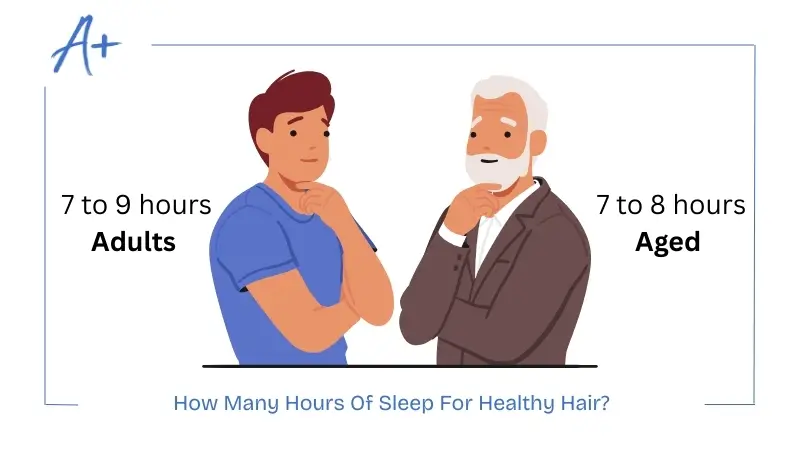
The National Sleep Foundation recommends 7 to 9 hours of sleeping time per night for adults aged 18 to 64 and 7 to 8 sleeping hours per night for seniors above 65 years of age.
If you are consistently getting less than 6 hours of sleep, it can negatively impact your hair health, so maintaining a proper sleep schedule is essential.
What Are Signs Sleep Deprivation Affects Hair?
If you are experiencing the hair loss issue, poor sleep might be a contributing factor. Understanding contributing factors and prioritizing better sleep are essential steps in fixing the hair loss problem.
Some signs of hair problems due to the lack of sleep are;
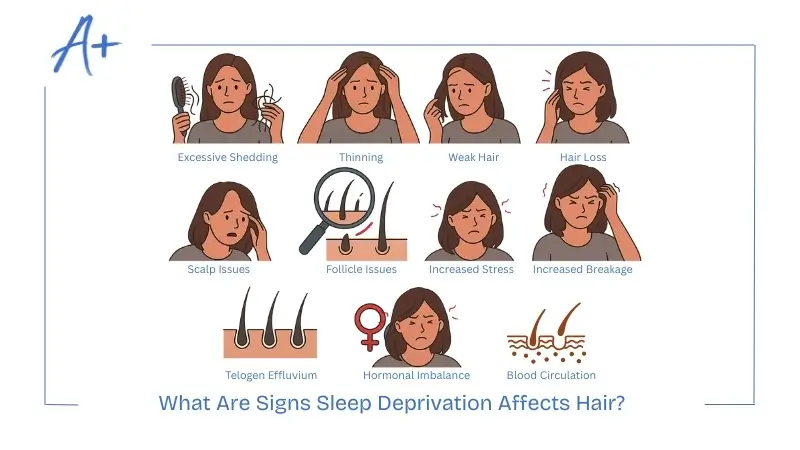
- Excessive Shedding: Losing more than 100 strands per day, which is higher than the normal range. Your brush, shower and drain will be full of your hair. And sometimes you feel a lot of hair on your pillowcase when you awake from sleep.
- Thinning & Widening Part Line: You can also notice hair thinning, particularly around the temples or crown, indicating that hair follicles are getting weak. Hair may appear thinner overall, and the line may become very prominent and wider than before.
- Lackluster & Weak Hair: Dry, brittle hair lacking shine and bounce due to reduced blood flow and nutrient supply to the skull.
- Hair Loss: Noticeable hair loss, which potentially leads to patches on the head.
- Stunted Hair Growth: Slowed hair growth or hinders new hair growth due to disrupted sleep cycle.
- Scalp Issues: Itchy and flaky scalp, which is also a sign of poor follicle health.
- Hair Follicle Issues: Stress from lack of sleep causes hair follicles to enter a resting phase, which is potentially leading to hair loss.
- Hormonal Imbalance: Disturbed hormonal functioning due to lack of sleep can impact hair growth.
- Poor Blood Circulation: Reduced blood flow to the scalp weakens hair follicles, depriving them of essential nutrients and oxygen.
- Increased Breakage: Hair is more likely to break and develop split ends.
- Increased Stress: Stress from lack of sleep can lead to hair loss and thinning.
- Telogen Effluvium: Chronic stress and sleep deprivation can also cause this temporary hair loss condition.
How To Prevent Hair Loss From Lack Of Sleep?
There are several ways to prevent hair loss:
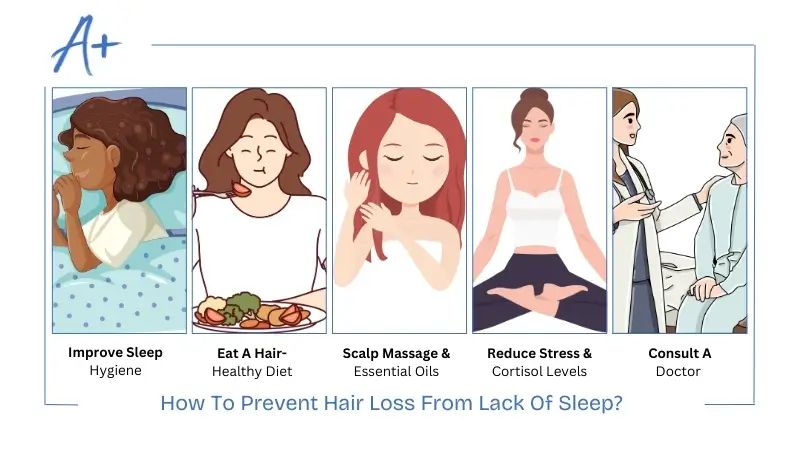
Improve Sleep Hygiene
Consistent sleep schedules enhance sleep quality by regulating the body’s internal clock. Maintain consistent sleep and wake times, even on weekends, to support your circadian rhythm.
Avoiding screens an hour before bedtime, as blue light from devices suppresses melatonin, the hormone responsible for sleep.
Maintaining a bedroom temperature of 60-67°F and ensuring darkness promotes better sleep by creating an ideal relaxation environment.
Eat A Hair-Healthy Diet
Nutrition is essential for hair growth. Protein-rich foods such as eggs, fish, and lentils are essential for strong hair growth. Iron and zinc, present in spinach, nuts, and red meat, are crucial for preventing hair thinning.
Biotin and vitamin D found in almonds, salmon, and mushrooms promote follicle health and minimize shedding.
A balanced diet provides essential nutrients for healthy hair growth and resilience.
Scalp Massage & Essential Oils
Enhancing blood flow to the scalp can mitigate the effects of poor circulation due to sleep deprivation. A daily five-minute scalp massage enhances nutrient delivery to hair follicles.
Rosemary oil can enhance circulation, while peppermint oil is recognized for its ability to stimulate hair growth. Both oils can be diluted and massaged into the scalp for additional benefits.
Reduce Stress & Cortisol Levels
Chronic stress and high cortisol levels significantly contribute to hair loss. Integrating meditation or deep breathing exercises into your daily routine can reduce stress hormones.
Engaging in regular physical activity, like yoga or walking, effectively lowers cortisol levels and enhances circulation.
Adaptogenic herbs such as ashwagandha and rhodiola can assist the body in managing stress, promoting improved sleep, and healthier hair.
Consult A Doctor
If hair loss persists despite lifestyle adjustments, consider consulting a professional. A dermatologist can evaluate for underlying conditions, including thyroid disorders, hormonal imbalances like PCOS or low iron, and autoimmune conditions such as alopecia areata.
Timely diagnosis and intervention can stop additional hair thinning and encourage regrowth.
Is Hair Loss From Lack Of Sleep Reversible?
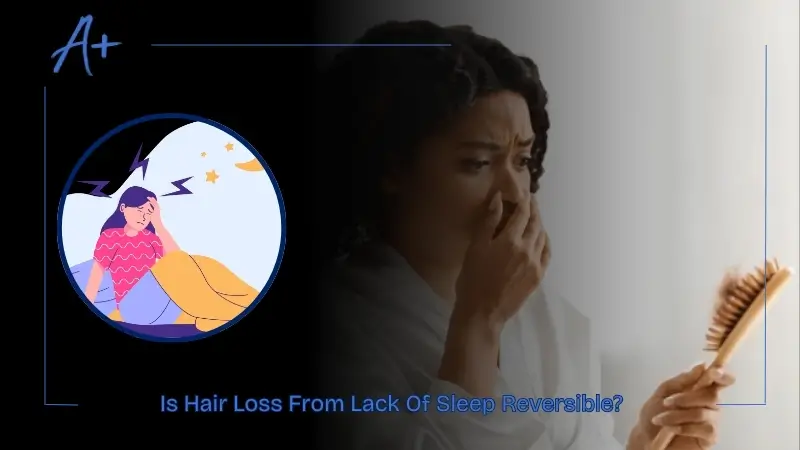
Yes, hair loss from lack of sleep is usually reversible. Chronic sleep deprivation disrupts hair growth, causing hair follicles to rest too soon.
By getting 7-9 hours of good sleep, lowering stress, and eating well, many people notice hair regrowth in 3-6 months as follicles start working again.
If sleep deprivation lasts for years or is linked with genetic factors like androgenetic alopecia, reversing some thinning may need medical help. To get the best results, tackle sleep problems early and help recovery with scalp massage, protein-rich foods, and stress management for better hair regrowth.
How To Prevent Hair Fall While Sleeping?
Here are some tips for improving your sleep routine and maintaining healthy hair;
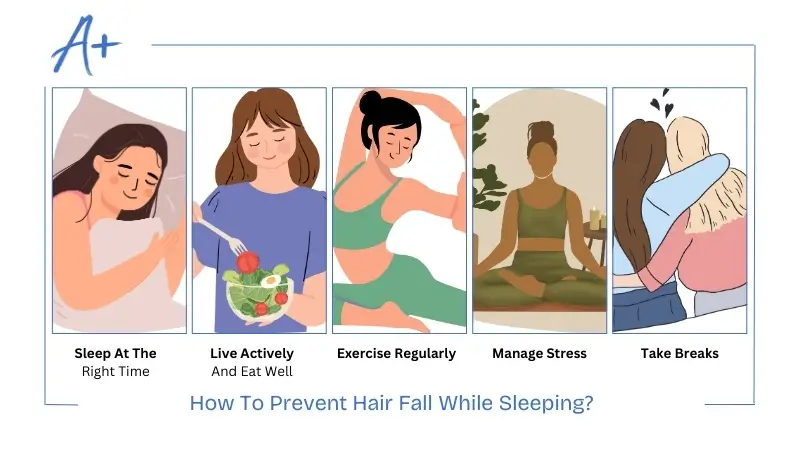
- Sleep At The Right Time: The best time to sleep is around 8 to 10 pm. This allows your body to reach deep sleep around 2 or 3 am, allowing it to produce essential hormones and cleanse all the organs.
- Live Actively And Eat Well: A balanced diet rich in sleep-promoting nutrients such as magnesium, potassium, and vitamin B6, promotes deeper and more restful sleep.
- Exercise Regularly: Adding exercise into your daily routine helps you sleep better at night.
- Manage Stress: Effective stress management techniques like deep breathing exercises, meditation, or yoga can improve sleep quality and help maintain healthy hair.
- Take Breaks: Short Breaks during the day for hobbies or time with loved ones can reduce stress and improve sleep.
What Is The Best Time To Sleep For Hair Growth?
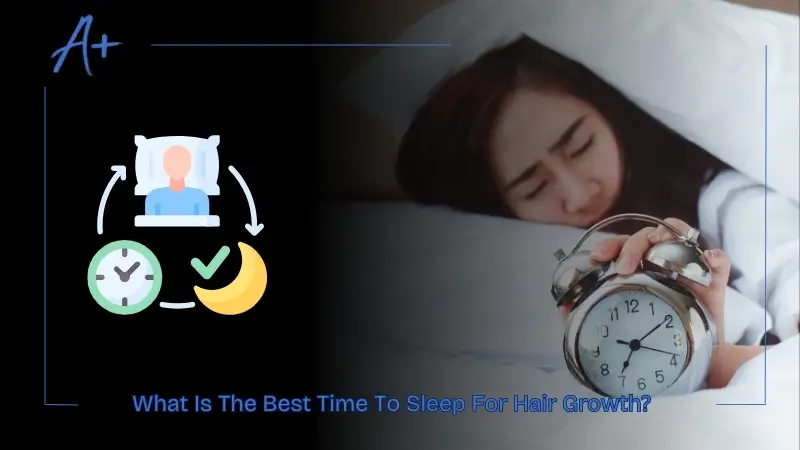
To ensure optimal hair health, try to sleep between 10 and 11 pm. This timing sync with the circadian rhythm that is naturally occurring in your body.
Melatonin production at its peak levels (10 PM–2 AM). Between the hours of 10 PM and 2 AM, your body generates 70% of its daily melatonin production.
By preventing damage to hair follicles and extending the growth phase (anagen), this potent antioxidant helps to maintain healthy hair.
The release of human growth hormone during deep sleep, which occurs before midnight, is responsible for stimulating the regeneration of hair follicles. Moreover, it improves the production of proteins, which results in stronger strands.
There are more restorative deep sleep cycles that occur in the hours before midnight, which is why getting some sleep earlier is important.
When you go to bed earlier, you boost the blood circulation to your scalp in the morning. Cortisol surges, which may cause hair loss, are reduced by this supplement.
Frequently Asked Questions
Will my hair grow back if I fix my sleep schedule?
Actually, changing your sleeping pattern and general lifestyle may help reverse hair loss brought on by stress or lack of sleep.
How much hair is normal to lose while sleeping?
You lose 50 to 100 hairs daily as part of the natural hair growth cycle. This includes hair shed during sleep.
Does exercise help hair growth?
Yes, exercise promotes hair growth. It improves blood circulation to the scalp, reduces stress, and boosts testosterone levels. These factors contribute to healthier hair follicles and growth.

